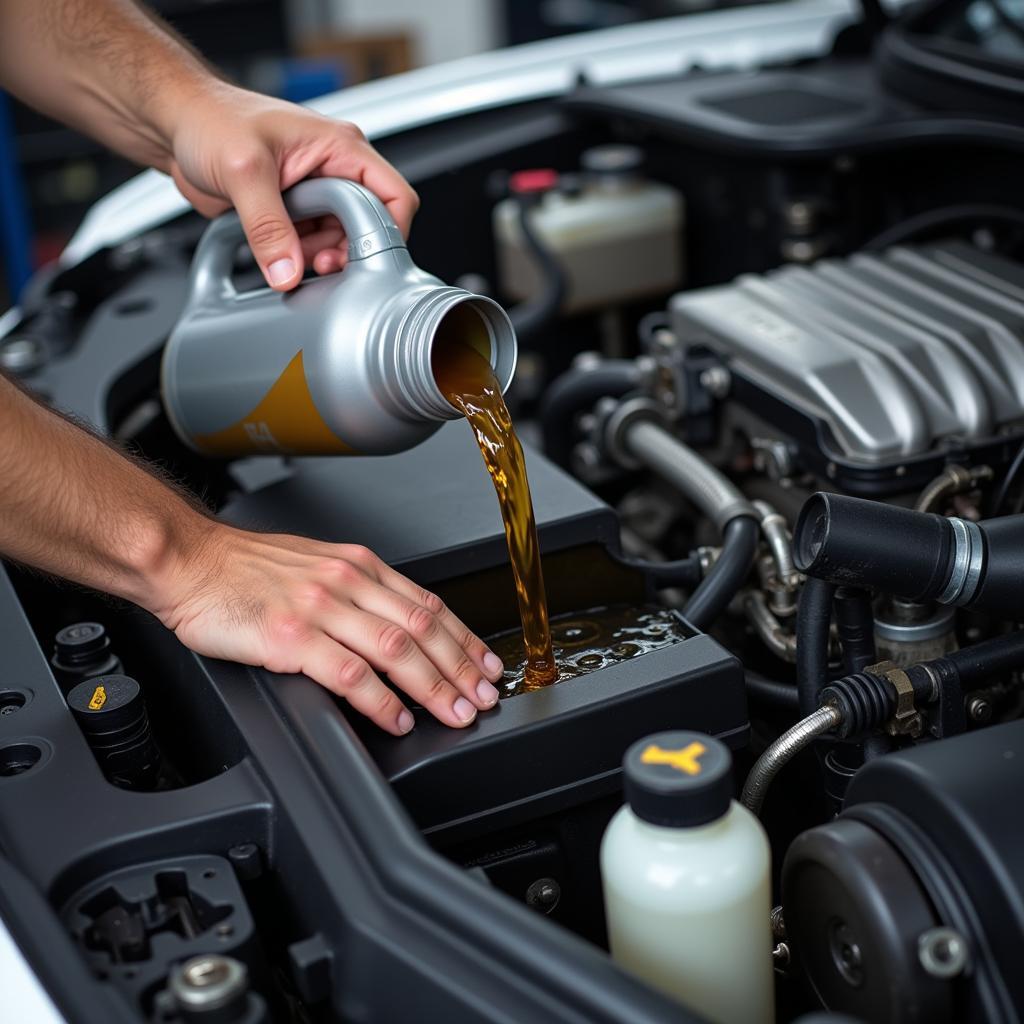What is Oil Service for Car?
Maintaining your car’s health involves a series of regular check-ups and services, and one of the most crucial among them is the oil service. But what exactly does oil service entail, and why is it so vital for your car’s performance and longevity?
An oil service, also commonly referred to as an oil change, is much more than simply replacing old oil with new. It’s a fundamental car maintenance procedure that ensures your engine runs smoothly, efficiently, and stays protected from wear and tear.
The Importance of Regular Oil Service for Your Car
Imagine your car’s engine as its heart; oil acts as the lifeblood, lubricating the moving parts, reducing friction, and preventing overheating. Over time, this oil degrades, accumulating dirt and debris, reducing its effectiveness. This is where regular oil service comes into play.
 Car Engine Oil Change
Car Engine Oil Change
Here’s why consistent oil service is non-negotiable:
- Engine Lubrication: Oil forms a protective layer between the moving components of your engine, minimizing friction and preventing premature wear and tear.
- Cooling: Oil absorbs heat generated by the engine, preventing overheating and potential damage.
- Cleaning: Oil picks up dirt, dust, and microscopic metal particles, preventing them from accumulating and causing damage to the engine.
- Improved Fuel Efficiency: Clean oil reduces friction, allowing the engine to operate more efficiently and potentially improving fuel economy.
- Extended Engine Life: Regular oil changes contribute significantly to the lifespan of your engine, saving you from costly repairs or replacements down the line.
What Happens During an Oil Service?
A typical oil service involves more than just an oil change. Here’s a breakdown of what a mechanic usually performs during an oil service:
- Draining the Old Oil: The engine is run for a short period to warm up the oil, making it thinner and easier to drain. The old oil is then drained from the engine oil pan.
- Replacing the Oil Filter: The old oil filter, responsible for trapping contaminants, is replaced with a new one.
- Adding New Oil: The correct type and amount of new oil, as specified by your car manufacturer, is added to the engine.
- Inspecting Other Fluids: Mechanics often check other essential fluids like coolant, brake fluid, and power steering fluid, topping them off if needed.
- Visual Inspection: A visual inspection of the engine bay may be conducted to check for any leaks, worn-out belts, or hoses.
How Often Does My Car Need an Oil Service?
The frequency of oil service varies depending on several factors, including:
- Car Make and Model: Refer to your car’s owner’s manual for the manufacturer’s recommended oil change intervals.
- Driving Conditions: Driving in harsh conditions like extreme temperatures, heavy traffic, or dusty environments may require more frequent oil changes.
- Oil Type: Synthetic oils generally have a longer lifespan than conventional oils, extending the time between oil changes.
Traditionally, the rule of thumb was to get an oil change every 3,000 miles or three months, whichever came first. However, with modern vehicles and advancements in oil technology, many cars can now go 5,000 miles, 7,500 miles, or even longer between oil changes.
Do lease cars include servicing? This is a common question, and the answer depends on the specific terms of your lease agreement.
Recognizing the Signs: When Your Car Needs an Oil Service
While adhering to the recommended service schedule is crucial, your car may sometimes require an oil change sooner. Here are some tell-tale signs:
- Oil Change Light: Pay attention to the oil change indicator light on your dashboard.
- Dark or Gritty Oil: If your engine oil appears dark, gritty, or sludgy upon checking the dipstick, it’s a clear sign it needs replacing.
- Engine Noise: Unusual noises like knocking or ticking sounds coming from the engine, especially during startup, can indicate inadequate lubrication.
- Burning Oil Smell: A distinct burning oil smell inside the cabin can point towards an oil leak or burning oil.
- Reduced Fuel Efficiency: A sudden and noticeable decrease in your car’s fuel economy can also be a sign of dirty engine oil.
Ignoring Oil Service: The Potential Consequences
Neglecting regular oil service can lead to several problems, some minor, some potentially catastrophic for your engine:
- Reduced Engine Performance: Dirty oil increases friction, leading to reduced engine power, sluggish acceleration, and decreased fuel efficiency.
- Overheating: As the oil loses its ability to dissipate heat, the engine can overheat, causing significant damage.
- Engine Damage: Prolonged driving with inadequate lubrication can cause irreparable damage to engine components, leading to costly repairs or even engine failure.
Conclusion
Oil service is an indispensable aspect of car maintenance, directly impacting your engine’s health, performance, and longevity. By understanding the importance of regular oil changes, recognizing the signs of degraded oil, and knowing when your car needs service, you can ensure optimal engine performance, increase your car’s lifespan, and avoid expensive repairs down the road. Remember, a well-maintained car translates to a smoother, safer, and more enjoyable driving experience.
For those interested in exploring other car services, we have resources available on who is the best car buying service and which is best aaa or usaa car buying service.

